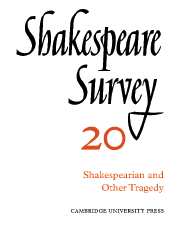Book contents
- Frontmatter
- Shakespeare, Fletcher and Baroque Tragedy
- Seneca and the Elizabethans: A Case-study in ‘Influence’
- George Chapman: Tragedy and the Providential View of History
- Critical Disagreement about Oedipus and Hamlet
- Shakespeare’s Thematic Modes of Speech: ‘Richard II’ to ‘Henry V’
- Anarchy and Order in ‘Richard III’ and ‘King John’
- The Staging of Parody and Parallels in ‘I Henry IV’
- Shakespeare’s Unnecessary Characters
- Walter Whiter’s Notes on Shakespeare
- Shakespeare’s ‘Romeo and Juliet’: Its Spanish Source
- The Grieves Shakespearian Scene Designs
- Shakespeare on the Modern Stage: Past Significance and Present Meaning
- Shakespeare in Brazil
- Recent Shakespeare Performances in Romania
- Shakespeare, the Twentieth Century and ‘Behaviourism’
- The Year's Contributions to Shakespearian Study 1 Critical Studies
- 2 Shakespeare’s Life, Times and Stage
- 3 Textual Studies
- Index
- Plate section
Seneca and the Elizabethans: A Case-study in ‘Influence’
Published online by Cambridge University Press: 28 March 2007
- Frontmatter
- Shakespeare, Fletcher and Baroque Tragedy
- Seneca and the Elizabethans: A Case-study in ‘Influence’
- George Chapman: Tragedy and the Providential View of History
- Critical Disagreement about Oedipus and Hamlet
- Shakespeare’s Thematic Modes of Speech: ‘Richard II’ to ‘Henry V’
- Anarchy and Order in ‘Richard III’ and ‘King John’
- The Staging of Parody and Parallels in ‘I Henry IV’
- Shakespeare’s Unnecessary Characters
- Walter Whiter’s Notes on Shakespeare
- Shakespeare’s ‘Romeo and Juliet’: Its Spanish Source
- The Grieves Shakespearian Scene Designs
- Shakespeare on the Modern Stage: Past Significance and Present Meaning
- Shakespeare in Brazil
- Recent Shakespeare Performances in Romania
- Shakespeare, the Twentieth Century and ‘Behaviourism’
- The Year's Contributions to Shakespearian Study 1 Critical Studies
- 2 Shakespeare’s Life, Times and Stage
- 3 Textual Studies
- Index
- Plate section
Summary
Once-upon-a-simple-time, while the modern languages were seeking to make their way as serious studies, the subject of ‘The Influence of Seneca on Elizabethan Tragedy’ was quite self-evidently an example of what serious study could provide in modern literature. The scholar who set out to study an author (‘B’) learned that the scientific way of doing this was to discover, embedded in B, the echoes or reminiscences of an earlier author or work (which we may call ‘A’). It was the business of thePh.D. student, charged with the investigation of B, to discover his ‘A’; then he could list the echoes and reminiscences, enlarge these into a discussion of ‘influence’—and his dissertation was made. Of such a kind, in the field under discussion here, the most notable example is John W. Cunliffe’s 1893 D.Litt. dissertation ‘The Influence of Seneca on Elizabethan Tragedy’—a book which has occupied its field with apparent adequacy since 1893, and which was reissued as recently as 1965. Professor Peter Ure could remark (in his Durham University Journal article of 1948, ‘On some differences between Senecan and Elizabethan tragedy’) that the day of Cunliffe ‘is now apparently past’; but this cannot be allowed to be entirely true in 1966. The central attack on Cunliffe, in Howard Baker’s Induction to Tragedy (1939), seems to have disappeared into the sands of time, and Cunliffe’s assumptions remain the common assumptions. I notice a bland restatement of them, as if of undisputed truth, in the preface to the excellent new Penguin translation of five Senecan plays (1966).
- Type
- Chapter
- Information
- Shakespeare Survey , pp. 17 - 26Publisher: Cambridge University PressPrint publication year: 1967
- 3
- Cited by



